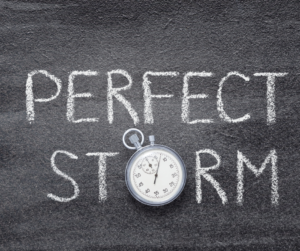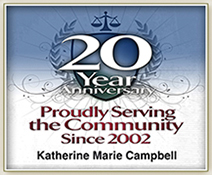The Perfect Storm Kept Me Out of Court
 What made me stop doing divorce work in court? An easy decision once I was ready. What made me ready? A perfect storm. Three different areas of my life came together to make clear something had to change.
What made me stop doing divorce work in court? An easy decision once I was ready. What made me ready? A perfect storm. Three different areas of my life came together to make clear something had to change.
The first spark was my two children. I moved my law practice home to be near their schools when the inevitable calls came. Both children struggled with significant health issues. I would learn about the underlying trauma years later. Self-harm and suicide threats that they would not come home after school-drop off. My youngest hiding in my office while my client and I reviewed horrific details as we prepared her restraining order declaration. Admonishments from the judge for background noise while I participated in a telephonic appearance from my home office. It was too much.
The second spark happened around that time too: that case. We had a lot of evidence, several instances of multi-day spans with hundreds of text messages from her ex, trackers he installed on her car, a camera installed in her computer, text messages from her spouse’s parents imploring her to drive directly to the police station during one stalking event. His attorney didn’t even cross-examine my client. We settled shortly after lunch.
The third spark was unexpected. In two different conversations with respected family law friends, I talked about my frustration with the piece missing from our system. I shared my struggles to find a solution. “Why stop going to court?” my friend asked. After I answered, she shared her carefully considered opinion: “That’s stupid.” This was after our shared mentor had already told me I “had lost the taste for blood.” Although they were both trying – in their own ways – to keep me from what they were certain was destruction of my successful family law practice, comments from dyed-in-the-wool litigators strengthened my resolve to stay out of court. Peacefully resolving that last restraining order case settled me in my decision to leave litigation.
Although I learned about collaborative early in my legal career, up until then it had seemed like a luxury to work with cooperative parties and counsel. Having a whole team on a case? It sounded too good to be true. I put it out of my mind, until that last case and the timely flyer for my collaborative divorce training.
Families going through divorce are restructuring their lives, adjusting roles, and learning new responsibilities because shared tasks must now be done in each home. Families being told what their life would look like rather than having any say in it really struck a raw nerve for me. Working through my own family struggles helped me see clearly how much families in divorce need to have a bigger role in reshaping their lives.
We shepherd families by telling them how they should work with their ex on the other side of divorce. Shouldn’t they be involved in figuring out what the other side looks like? Can’t we provide them with some tools to use on the other side of this transition?
I regret that it took a perfect storm to get me here and at the same time, I am so grateful to be here. It is not stupid, as my friend said. It is incredible to meet people at their darkest times and help them leverage their own inner strengths to get to the other side of this transition. To watch families, grow from this, to find their own power, and fully embrace it. It is an honor to be a part of it.
Yes, I lost the taste for blood, so much so, I am vegan now.

